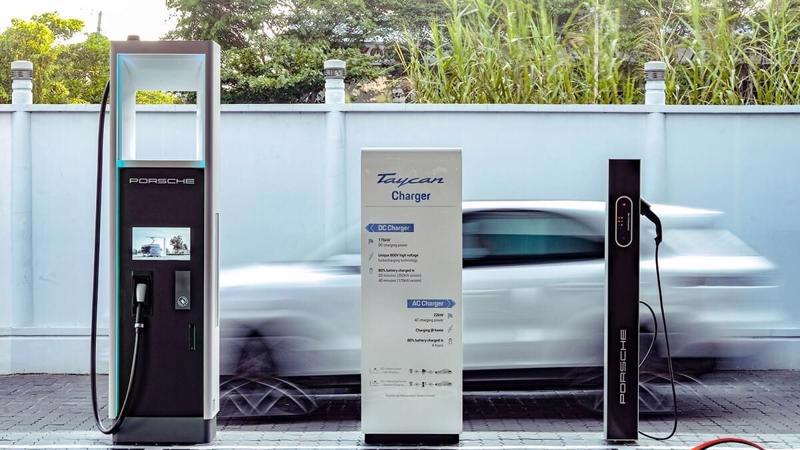The rise of electric vehicles (EVs) is contributing to carbon net zero and propelling a sustainable source of long-term economic growth for Vietnam, according to HSBC's report released on May 9.
The rise of Evs
Local EV makers have been particularly successful in electrifying two-wheelers. Today, Vietnam’s electric two-wheeler (E2W) market is the largest in ASEAN and second-largest worldwide, just behind China. Looking ahead, Vietnam’s EV market has ample room for further growth.
"While projecting the future of a rapidly evolving industry is difficult, our estimate—that Vietnam’s annual combined E2Ws and electric car sales could rise from less than one million in 2024 to over 2.5 million by 2036—provides a rough sense of this industry’s market potential in Vietnam," report noted.
"We anticipate that E2Ws will lead the way in Vietnam’s EV surge. Compared to electric cars, E2Ws are more affordable with greater vehicle component similarity, and which already boast a high rate of local production. Vietnamese consumers transitioning to EVs will also be more accustomed to two-wheelers, which outnumber the relatively pricier four-wheel cars by 30 to 1."
In fact, the predominance of two-wheelers—in both electric and fossil fuel varieties—is not limited to Vietnam.
According to Bloomberg NEF’s EV sales projections, it is a phenomenon across all of Southeast Asia. By the late 2030s, however, HSBC expects E2W sales to flatten out in Vietnam as the local two-wheel market saturates.
Meanwhile, Vietnam’s electric car market has enormous untapped potential given that over 60% of the population owned a motorcycle in 2020, compared to only 5.7% that owned a car. Many in the industry are confident that Vietnam can fulfil its electric car potential. For example, the Vietnam Automobile Manufacturers Association has estimated that the country will have 3.5 million electric cars on the road by 2040.
Infrastructure investment is key
However, domestic Vietnamese EV makers, such as the industry leader VinFast, will face challenges replicating E2W success in the electric car segment. Hesitant Vietnamese consumers often cite high prices, range anxiety, battery concerns, and inadequate charging station infrastructure as concerns.
Some of these EV adoption barriers can be overcome through government policy support. For example, Vietnam has implemented a battery electric vehicle (BEV) registration fee exemption, reduced BEV import duties, and exempted BEV investment projects from corporate income tax.
Vietnam’s Ministry of Transport (MoT) also proposed a policy to provide a subsidy worth $1,000 to each electric car buyer, but faces resistance from the Ministry of Finance.
"In our view, the key to overcoming Vietnam’s electric car adoption barriers lies in the infrastructure investment, which is also a hurdle for the country’s overall energy transition," report said.
According to HSBC, just installing enough renewable electricity generation capacity and EV charging infrastructure for the new EVs projected will require roughly $12.3 billion of investment and 14tWh of energy cumulatively from 2024 to 2040.
In addition, Vietnam can also enhance the domestic EV ecosystem by leveraging its plentiful rare earth reserves, with the world’s second largest amount of rare earth reserves behind China. Although rare earths are less well known than lithium, which plays a prominent role in EV battery supply chains, these 17 elements remain critical to electric car production. In particular, neodymium and samarium are often used in motor magnets.
The success of Vietnam’s green automotive transformation also depends on continued foreign investment and partnerships with local firms. Japanese and Korean multinational companies have historically played a significant role in Vietnam’s automotive industry. This is evident in the list of Vietnam’s top ten foreign corporate taxpayers for 2022, including automakers such as Honda, Toyota, and Hyundai.
Outlook for future
As transportation electrification accelerates in Vietnam, HSBC expects the two-wheel market share of leading Japanese corporates, who primarily focus on the internal combustion engine (ICE) vehicle segment, to be reduced in favour of local players dominating E2Ws.
Some industry observers anticipate that VinFast, which plans to expand annual production capacity from 250,000 vehicles to 1 million, could eventually become a leading EV exporter to the rest of ASEAN. Indonesia will likely be the key overseas market for VinFast and other Vietnamese EV producers, given its geographic proximity and large population. VinFast recently signed an MoU to supply three Indonesian businesses with 600 EVs and is also in the process of establishing an EV assembly plant in the country.
"As Vietnam’s E2W and electric car markets expand, we anticipate that domestic producers will focus more heavily on securing the entire EV supply chain while also stepping up cooperation with Chinese firms," report noted.
For instance, VinFast’s parent company has partnered with China’s Gotion High-Tech to develop several LFP (lithium ferrous phosphate) batteries and build two lithium-ion factories in Ha Tinh province that are set to open in the third quarter of 2024. More recently, Vietnam’s TMT Motors announced a strategic cooperation agreement with an SAIC-Wuling and GM joint venture to manufacture and distribute Wuling-branded EVs in Vietnam.
In early April, Chery Automobile announced that it would be the first Chinese firm to establish an EV plant in Vietnam. The $800 million assembly plant, a joint venture with Vietnam’s Geleximco in the coastal province of Thai Binh, will have the capacity to produce 200k vehicles annually after completion in the first quarter of 2026.
Increased Chinese involvement could also foster greater production integration with neighbouring Thailand, where BYD is building a $504 million plant that will export EVs to Vietnam under the zero percent import tax applicable to ASEAN economies.
"By leveraging Chinese partnerships and overcoming adoption barriers—both at home and abroad—we think Vietnam has the potential to speed ahead of its ASEAN neighbours in the green mobility race," report noted.









 Google translate
Google translate